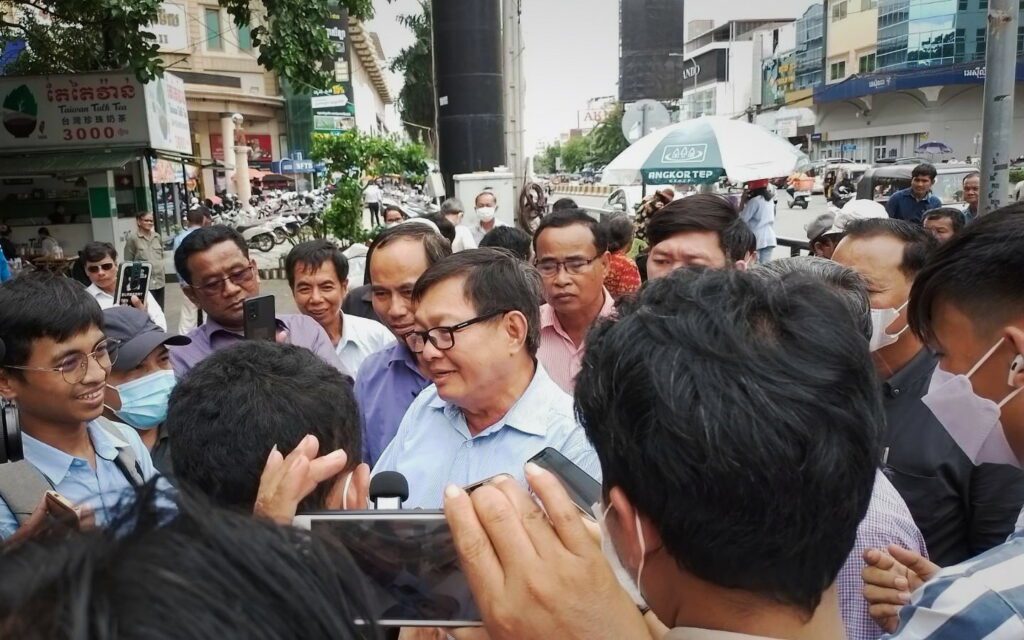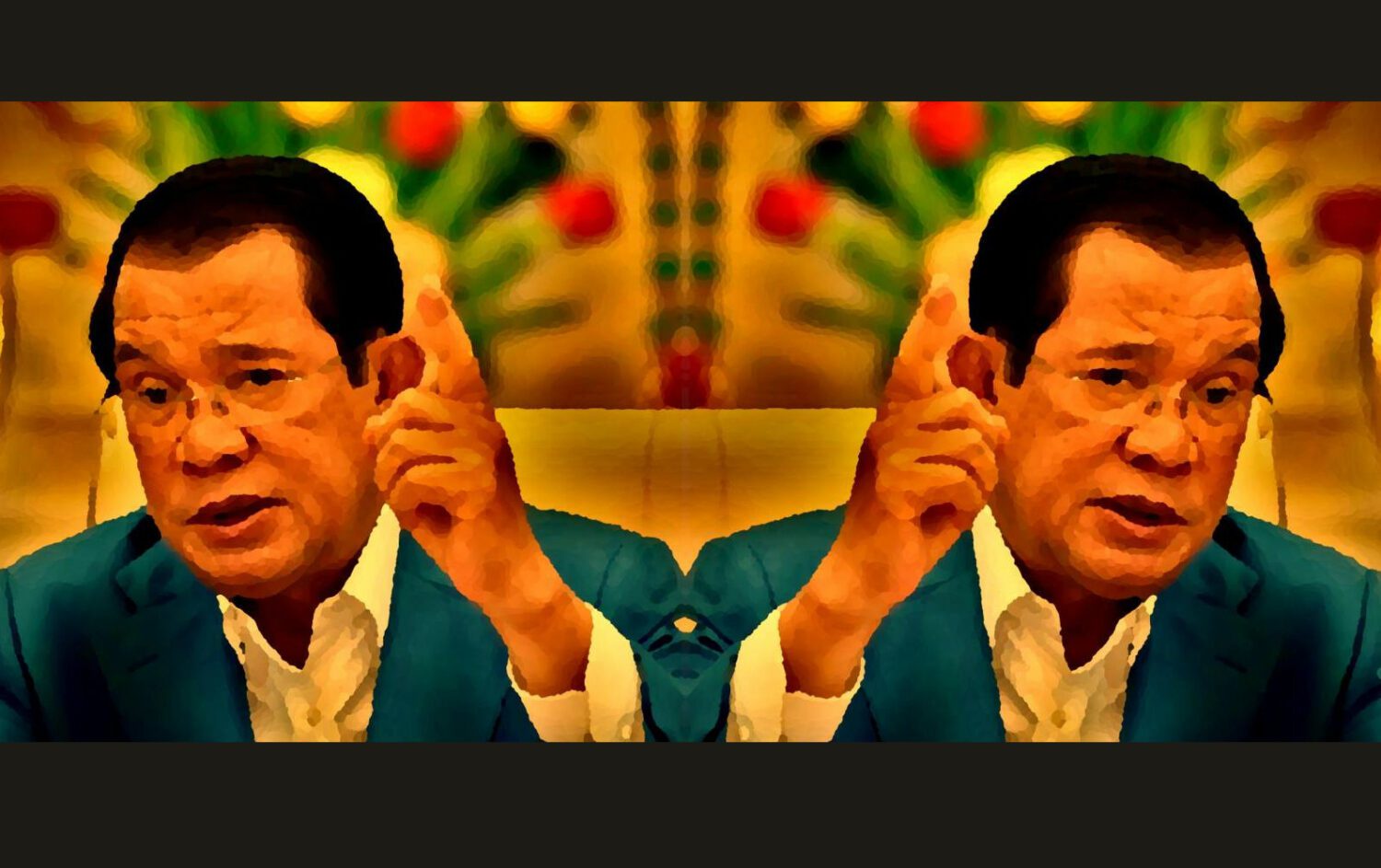Cambodia’s opposition has been through this before.
All month, Prime Minister Hun Sen has unleashed unusually colorful diatribes against exiled opposition leader Sam Rainsy, calling him the most treacherous person in the last 500 years of Cambodian history and proclaiming he would rather dine with Khmer Rouge officials responsible for the genocide than his former foe.
Then this week, he called on all opposition Candlelight Party councilors to defect, days after admitting the ruling party had infiltrated an opposition Zoom meeting and threatening to dissolve “a party” involved with Rainsy — an obvious jab at Candlelight. Members have since reported they are under pressure to thumbprint petitions denouncing former opposition leader Rainsy for allegedly insulting the king.
The ramped-up rhetoric hearkens back to the events that culminated in the Supreme Court-ordered dissolution of the Cambodia National Rescue Party in 2017, which saw top leaders flee the country and set the stage for a mass trial against more than 100 political dissidents.
“People just experienced this five years ago and now we’re experiencing it again,” said Candlelight national treasurer Seng Mardi, a former Sam Rainsy Party senator. “The threatening, and the lawsuits, and dissolving the party — it’s very fresh in their minds.”
The parallels are striking. After the CNRP’s notable gains in the 2017 commune election, Hun Sen’s anti-opposition rhetoric reached new heights, repeatedly claiming that there was a “color revolution” underway and urging the military to protect the “legitimate government.”
What followed was systematic targeting of Rainsy — who was already in exile and facing defamation charges for accusing the government of arranging the killing of activist Kem Ley — and the September 2017 arrest of party president Kem Sokha. The party was banned two months later, with Hun Sen giving members about two weeks to defect.
This time around, the Candlelight Party has proven a lesser threat. Candidates won just over 2,000 council seats in the recent commune election compared to the CPP’s 9,000-plus. Yet Hun Sen has trotted out his favorite anti-Rainsy tropes and then some, with no public event — graduation speeches, a flooding aid tour, a voter registration event — safe from anti-opposition tirades.
The government has similarly sought legal action against leaders, hitting Son Chhay with defamation charges and $750,000 in damages related to his criticisms of the election.
Whether the current pressure could end in a similar fate for Candlelight as its predecessor remains to be seen. But opposition leaders claim that while the atmosphere now is reminiscent of five years ago, they are more prepared than CNRP leaders back then.
“The dissolution of CNRP was, at the end, very sudden,” recalled Mu Sochua, a former CNRP leader living in exile. “We shouldn’t have been surprised. We should have been ready for it. But we were not.”
People just experienced this five years ago and now we’re experiencing it again.
Seng Mardi, Candlelight Party treasurer
In contrast, Mardi said he has hosted back-to-back meetings with party councilors and members in Battambang province this week, trying to quell concerns over alleged intimidation and reassure local councilors that their membership is perfectly legal. No one has defected, he said.
The party has assigned members to stay overnight at the homes of councilors who refused to thumbprint the petition denouncing Rainsy, he added, and plans to file complaints with the NEC and the Ministry of Interior.
Yet Candlelight has taken a generally low-profile approach, shying away from condemning alleged intimidation before the commune election and coaching its members to keep a positive tone on social media. Party statements this week called on members to “stay calm” and affirmed respect for the king’s constitutional role in the country.
“I’m not concerned at all. Like any storm, it will pass,” Mardi said. “As a party, we have not done anything [wrong] and we have issued public statements about independence and compliance with the laws and regulations of the country.”
The CNRP made a similar calculation five years ago. In August of 2017, Son Chhay said that his strategy was to play it safe and “keep the party alive until the election.” Political analyst Sebastian Strangio concurred that “it probably doesn’t make sense to inflame his anger by calling for protests or taking a stronger line on the current crackdown” given Hun Sen’s “mood.”
Three months later, the party was dissolved.
Still, Strangio said in a phone call this week that he views the prime minister’s recent behavior more as a sign of personal animosity than impending dissolution: Earlier this month, a French court cleared Rainsy of libel charges that Hun Sen filed against him in 2019, possibly uncorking a fresh wave of anti-Rainsy feelings.
“Banning political parties is something that resonates internationally even for people who pay no attention to Cambodia,” he said. “It tends to attract the attention of people worried about China’s growing influence in Cambodia and are willing to connect that to the authoritarian turn we’ve seen over the past decade.”

Indeed, the 2017 CNRP ban — along with sanctions against civil society and the closure or takeover of Phnom Penh’s largest independent newspapers — prompted much international hand-wringing. The European Union withdrew Cambodia’s preferential “Everything But Arms” access to its market in 2020 in part because of the lack of credible political opposition, while some American senators have pushed for sanctions against top Cambodian officials.
The State Department also said it would bar multiple Cambodian elites from U.S. travel “in direct response” to the country’s anti-democratic actions in 2017, though the scope of the ban was not clear.
Practically speaking, the ruling party’s centralized power has remained untouched. Hun Sen has served as ASEAN chair this year, and Phnom Penh will be home to the ASEAN Summit in November.
Asked what he learned from the CNRP’s dissolution — and about past criticisms of the party’s seeming lack of response at the time — vice president Thach Setha said he couldn’t comment on “anything that has not happened yet” but is pushing local councilors to collect evidence of alleged intimidation to report to the Ministry of Interior.
“What we have tried is to show our innocence,” Setha said. “If they continue to do what they did before, it is a kind of abuse of us.”
Local leaders such as Mey Sophorn, the party’s second deputy commune chief from Svay Rolum commune in Takhmao, may push for a more full-throated response. The party would gain nothing from staying quiet, just like the CNRP, he said.
“If there is any dissolution, the Candlelight Party’s leaders should show their stance of strong protest in relation to the court procedure, or try their best with what the party can do,” he said.
As an opposition member since 2007, Sophorn said that he and other activists wanted to protest in 2017. But party leaders asked them to stay calm.
Additional reporting by Ouch Sony












